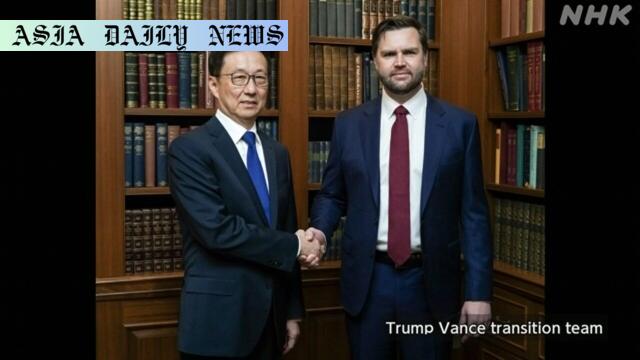Han Zheng meets JD Vance and Elon Musk to discuss economic relations and cooperation.

Chinese Vice President Han Zheng made a notable visit to Washington, where he met with U.S. Vice President-elect JD Vance and tech entrepreneur Elon Musk on Sunday. The discussions highlighted the importance of bolstering economic ties between China and the United States, a topic of strategic importance as both nations navigate a turbulent era of trade and political relations.
The visit by Han coincided with his attendance at the inauguration ceremony for President-elect Donald Trump. This underscores China’s effort to engage proactively with the incoming U.S. administration, particularly on sensitive issues like trade relations that have witnessed friction under the current geopolitical climate. Trump’s administration has proposed imposing additional tariffs on Chinese imports, a move that could further complicate bilateral ties.
In his meeting with JD Vance, Han emphasized the critical nature of economic and trade relations to both countries. He acknowledged that while differences exist, there is a vast expanse of common interests and opportunities for collaborative progress. Han underscored the need for continuous dialogue, reiterating China’s commitment to fostering a stable and constructive relationship with the United States.
Vance reportedly conveyed similar sentiments, recognizing the mutual benefits of robust economic engagement between the two nations. He indicated hopes for global peace and stability, marked by enhanced dialogue and deeper cooperation with China. Such discussions signal potential areas for alignment, even as the backdrop remains challenging.
Han’s interactions with Elon Musk turned the spotlight on private sector engagement, particularly in high-tech industries. Musk, whose enterprises like Tesla have made significant inroads into the Chinese market, was welcomed by Han to continue exploring opportunities in China. The vice president invited U.S. tech firms to partake in China’s developmental growth and contribute further to the burgeoning economic relationship between the two countries.
Musk, poised to assume a prominent role in the Trump administration, assured his commitment to fostering greater economic exchanges between the U.S. and China. With technology and innovation serving as key drivers of global progress, the potential collaboration between American tech giants and China’s industrial landscape remains promising.
Despite the positive exchanges, underlying tensions loom large. Trump’s proposed tariff plans have created an air of uncertainty over the future of U.S.-China trade. In this context, Han’s call for a mutually beneficial economic relationship serves as a diplomatic overture to ease the friction. The emphasis on dialogue and cooperation reflects an acknowledgment of the challenges while signaling a willingness to work through them constructively.
As the global economy faces headwinds from geopolitical tensions, Han Zheng’s outreach in Washington presents an important moment in U.S.-China relations. It remains to be seen how the incoming administration will respond to these discussions and whether both nations can strike a more collaborative note amidst the prevailing challenges.
Commentary
The recent visit by Chinese Vice President Han Zheng to Washington comes at a pivotal moment in U.S.-China relations. As two of the world’s largest economies, their interactions carry significant implications not only for bilateral ties but also for the global economic landscape. Han’s meetings with both JD Vance and Elon Musk indicate an earnest attempt from the Chinese side to nurture dialogue amid rising tensions.
One of the more encouraging aspects of Han’s visit was the mutual acknowledgment of the importance of economic and trade relations. Despite the evident friction in recent years, particularly as trade wars and tariffs dominated discussions, these meetings suggest that pragmatic diplomacy is still possible. Vance’s commitment to fostering global stability and Musk’s pledge to enhance trade partnerships reflect avenues for collaboration that transcend political divides.
The inclusion of a tech magnate like Musk in these discussions signals the relevance of technology in shaping future relations. Tesla’s success in China demonstrates the potential for mutually beneficial partnerships, even amid broader geopolitical challenges. By welcoming tech firms to partake in China’s growth, Han highlighted the role of innovation as a bridge between the two countries.
However, underlying concerns cannot be ignored. Trump’s proposed tariff measures cast a shadow over these discussions, potentially complicating the economic landscape further. While calls for cooperation are commendable, implementing tangible measures and overcoming trust deficits will require significant political will on both sides.
As the global economy grapples with the ramifications of pandemic recovery and geopolitical uncertainties, the U.S. and China have an opportunity to lead by example. Whether it’s through addressing trade imbalances, fostering innovation-driven growth, or ensuring market access, the path forward must be marked by constructive engagement rather than confrontation.
In conclusion, Han Zheng’s outreach in Washington exemplifies the potential for diplomacy even in challenging times. It serves as a reminder that while differences exist, shared goals can still drive progress. The hope is that these discussions pave the way for a more collaborative and stable relationship between the two global giants.


